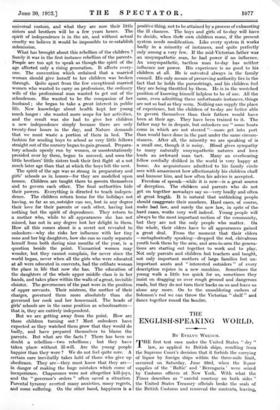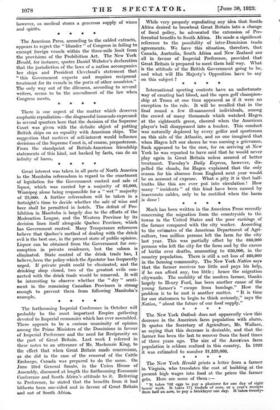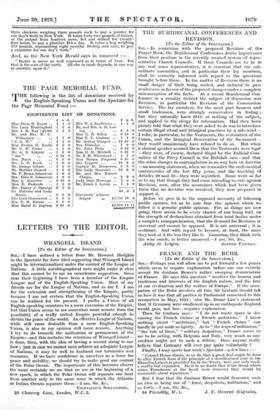THE
ENGLISH-SPEAKING WORLD.
BY EVELYN WRENCH.
THE first test case under the United States " dry " law, as applied to British ships, resulting from the Supreme Court's decision that it forbids the carrying of liquor by foreign ships within the three-mile limit, occurred on Saturday, June 23rd, when the liquor supplies of the ' Baltic' and Berengaria ' were seized by Customs officers at New York. With what the Times describes as " careful courtesy on both sides " the United States Treasury officials broke the seals of the British Customs and removed the contents, leavings_ however, as medical stores a generous supply of wines and spirits., * The American Press, according to the cabled extracts, appears to regret' the " blunder" of Congress in failing to exempt foreign vessels within the three-mile limit from- the provisions of the Prohibition Act. The New York Herald, for instance, quotes Daniel Webster's declaration- that the jurisdiction of the laws of a nation accompanies her ships and President Cleveland's statement that " this Government expects and requires reciprocal treatment for its vessels in the ports of other countries." The only way out of the dilemma, according to several writers-, seems to be the amendment of• the- law when Congress meets.
* *- *
There is one aspect of the matter which deserves emphatic repudiation—the disgraceful innuendo expressed in several quarters here that the decision of the Supreme Court was given with the definite object of putting British ships on an equality with American ships. The suggestion that motives of self-interest would influence decisions of the Supreme Court is, of course, preposterous. From the standpoint of British-American friendship statements of this kind, not backed by facts, can do an infinity of harm.
Great interest was taken in all parts of North America- in- the Manitoba-referendum-in regard to the enactment of legislation for the Government control and sale of liquor, which was carried by a- majority of 35,000, Winnipeg alone -being responsible for- a " wet" majority of 25,000. A further- referendum will be taken in a- fortnight's time to decide whether- the sale of wine and beer shall. be permitted: in hotels.. The defeat of Pro- hibition in Manitoba. is largely due to the efforts -of- the Moderation League, and the Western Province by its- decision lines itself alongside Quebec Province, which has Government control, Many Temperance reformers- believe that Quebec's method of dealing with. the drink evil is the best one, in the present state of public opinion: Liquor can be obtained from the Government for- con- sumption in private residences, but the saloon is elimihated. State control of the drink trade. has, I. believe, been the policy-which the Spectator has frequently. urged. If private profit could be eliminated, and the drinking shop. closed; two of: the greatest evils con-- nected with- the drink- trade would be removed: It- will- be interesting to observe whether the " dry " senti- ment in. the remaining Canadian Provinces is strong! enough to prevent them from following Manitoba's- example.
* *
The forthcoming Imperial Conference in October will probably be the most important Empire gathering devoted to Imperial economics which has ever assembled. There appears to be a curious unanimity of opinion among the Prime Ministers of the Dominions in favour of Imperial Preference and the need for Reciprocity on the part of Great Britain. Last' week I referred in these notes to an utterance of Mr. Mackenzie King; to the effect that when Great Britain made concessions, as she did in the case of the removal of the Cattle Embargo, Canada was prepared to do the same. On June 28rd General Smuts, in the Union House of Assembly, discussed at length the forthcoming Economic Conference and South Africa's- attitude to it. Referring to Preference, he stated that the benefits from it had hitherto been one-sided and in favour of Great Britain and not of South Africa. While very properly- repudiating any idea that South, Africa desired to browbeat Great Britain intan change of fiscal policy, he advocated the extension- of Pre-, ferential benefits to South Africa. He made a significant reference to the possibility of inter-Dominion trade agreements. We have this situation, therefore, that Canada, Australia, South Africa and- New Zealand• are' all in favour of Imperial Preference, provided, that- Great Britain is- prepared to meet them half way. What is the attitude of the British Government going to be, , and what will His Majesty's Opposition have to say on this subject ?
International sporting contests have an unfortunate way of creating bad blood; and the open golf champion- ship at Troon at one time appeared as if it were no exception. to the rule. It will be recalled. that in the final round a few ill-mannered- individuals,, among, the crowd- of many thousands which watched. Hagen. at the eighteenth green; cheered when the American, player's ball disappeared into a bunker. This conduct was naturally deplored by every golfer and sportsman on this side of the Atlantic, and no one imagined that when Hagen left our shores he' was nursing. a grievance. Such appeared to be the case, for on arriving at New York- he was reported to have said that he would . never play again in Great Britain unless assured of better treatment. Tuesday's• Daily- Express, however; dis-. pelled the clouds, for. Hagen explained that the only reason for his absence from England.- next year would. 'be on account of expense. What a pity it- is that. half- truths like this are ever put into circulation ! How many " incidents " of this kind. have been caused by inaccurate, cables, only to be rectified. when the harm. is done !
* * * * Much has been written in the American Press -recently concerning the migration from the countryside to the towns in the United States and the poor earnings of the farmer compared with the city worker. According. to the estimates of the American Department of Agri- culture, two million persons left the farm for the city. last year. This was partially offset by the 880,000 persons who left the city for the farm and by the excess of births over deaths, amounting to 650,000, in the- country population. There is still a net loss of 460,000 in the farming community. The New York- Nation says that the farmer receives too little and pays his help, , if he can afford any, too little ; hence the migration citywards. The mobility of the modern farmer, thanks . largely to Henry Ford, , has been another cause of the young farmer's " escape from bondage." How the problem is to be met is another matter. " It is time for our statesmen to begin .to think seriously,"- says-the Nation, " about the future of our food-supply."
The New York Outlook does, not apparently view• this decrease in the. American. farm population with alarms . It- quotes the Secretary of Agriculture, Mr. Wallace,., 'as saying' that this decrease is desirable, and that the farmer has been the last to recover from the hard times of three years ago. The size of the American farm population is seldom realized in this country. In 1920 it was estimated to number 81,359,000.
* * * * The New York Herald prints a letter from a farmer in Virginia, who translates the cost of building at the present high wages into food at the prices the farmer gets. Here are some of them
"It takes 762 eggs to pay a plasterer for one day of eight. !hours' work. It- takes 171 bushels of corn, or a. year's receipts from half an. acre, to pay a-brieklayer:one day. It-takes4twenty-- three chickens weighing three pounds each to pay a painter for one day's work in New York. It takes forty-two pounds of butter,. or the output from fourteen cows, fed and milked for twenty- four hours, to pay a plumber $14 a -day. It takes a hog weighing 175 pounds, representing eight months' feeding and care, to pay a carpenter for- one day's work."
And, as the New York Herald says in comment :-
" Barter is never so well expressed as in terms of food. For that is the coin of the earth. All else in trade depends, in one way or another, upon it."












































 Previous page
Previous page